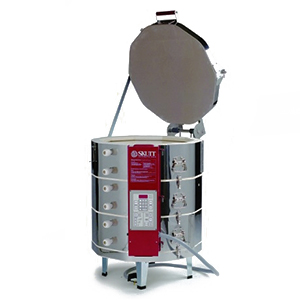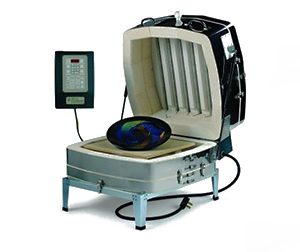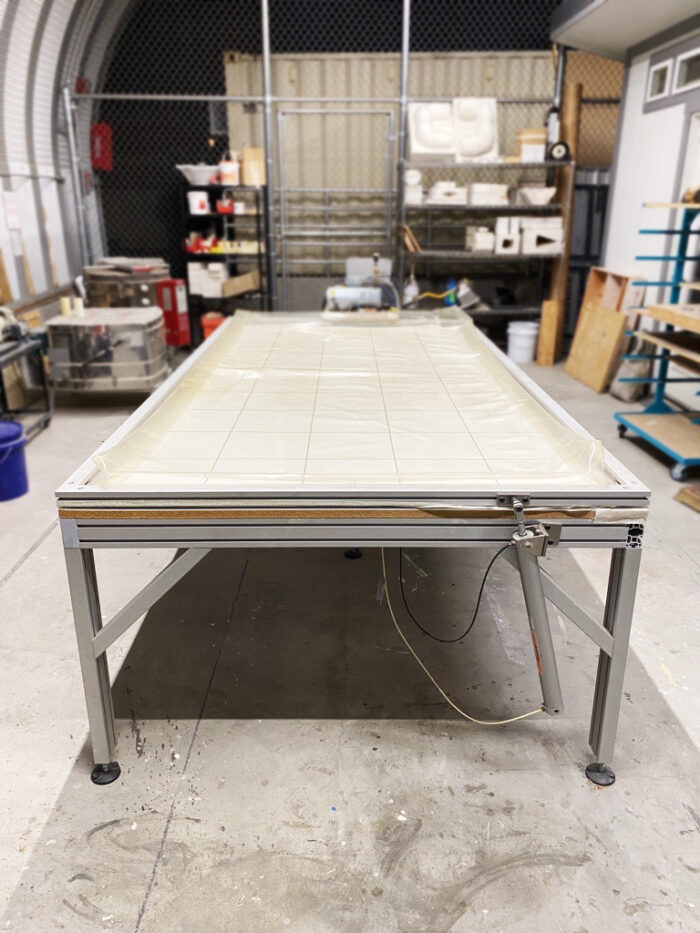Materials Lab
Shaping the Future of Practice
Woodbury has been investigating the architectural implications of material experimentation for years. Now the Making Complex has a dedicated facility for such intrigue.
Digital Knitting
With the addition of the Stoll flat bed knitting machine, students can design and produce fashion and technical knit fabrics.
STOLL CMS530 HP MULTI-GAUGE
superfine yarns
max width: 50″
Digital Knitting Operation Details
1. Enrolled in machine-focused studio.
2. Completion of the Digital Knitting orientation.
We do not offer self-guided training for the Digital Knitting at this time.
The digital knitting machine does not yet have any established policies.
All material and machine restrictions will be developed and communicated through knitting focused design studios.
Dye Lab
Most often embraced by the Interior Design programs, the dye lab provides students with a dedicated space for fabric manipulation practices.
Dye Lab Operations Details
1. Enrolled in fabric-based or fashion studio.
The fabric dying tools does not yet have any established policies.
All material and use restrictions will be developed and communicated through fabric dying focused design studios.
Ceramics
Whether a student want to fire their clay 3d print or experiment with producing custom clay bodies, the ceramic tools play a useful role as part of the Materials Lab.

Ceramics Kiln
chamber size: 22″ x 22″ x 27″
max temp: cone 10

Mixer & Pugmill
For preparing custom clay bodies
max extrusion: 3″ diameter
Ceramics Operation Details
The ceramic and glass tool suite is a narrow interest, supporting a studio specific needs – but also expands the services within the Making Complex.
1. Completion of the Clay 3d Printing orientation.
Any student needing to fire their clay parts in the kiln must know what cone # is recommended by the clay manufacturer.
All clay parts must be completely dry before firing. (2 days minimum)
A facility technician must be present while programming the kiln.
Glass Forming
In addition to the clay tools, a glass kiln is available for the curious. The glass kiln is able to perform three operations: melt glass pieces together, tack fuse pieces together and slump glass into molds.

Glass Kiln
chamber size: 24″ x 24″ x 12″
max temp: 1800F
Glass Forming Operation Details
The ceramic and glass tool suite is a narrow interest, supporting a studio specific needs – but also expands the services within the Making Complex.
1. Enrolled in a glass-focused design studio.
2. Completion of the Glass Forming orientation. We do not offer self-guided training for the Glass Forming tools at this time.
The Glass Forming does not yet have any established policies.
All material and use restrictions will be developed and communicated through glass forming design studios.
Vacuum Press
The vacuum press table allows for the easy lamination of material layers into solid stock.

Vacuum Press
Maximum stock size – 48” x 96” x 5”
Vacuum Press
The vacuum press table allows for the easy lamination of material layers into solid stock.
Consultation with Making Complex staff
Any student needing to use the vacuum press table must consult with a facility technician regarding desired materials and adhesives for lamination.
A facility technician must be present while operating the vacuum press table.
Casting
Working with fluid-based materials such as concretes and plasters can initially be chaotic and messy. The Casting Yard gives students a space to work without the burden of perfect tidiness. The Making Complex has an adequate amount of tools and equipment to aid in the preparation of mold-part processes.
CEMENT MIXER
for preparing cement slurries
max. of 5 gallons
CEMENT MIXER
for preparing cement slurries
max. of 1.5 cubic feet
Operation Details
The yard outside of the workshop is reserved for working with fluid-based material, such as Concretes and Plasters. Within the gated zone marked for casting, students are free to work preparing and casting molds. The remaining yard is open to being reserved by Faculty for larger studio builds.
The space simply comprises of a collection of outdoor work tables, access to a hose/faucet and trash bin for disposal of unused material.
1. Completion of Wood Shop orientation.
We do not offer self-guided training for the Wood Shop Orientation at this time.
Any students needing to work with fluid based materials must use the Casting Yard for all production.
CONCRETE AND PLASTER IS NOT AUTHORIZED FOR USE OUTSIDE OF THE CASTING YARD
All remaining material must be disposed of in the marked drums.
Casting projects must be kept clean and consolidated to ensure others have space to work.
Making Complex staff do not clean up after students.
Casting Yard can only be used during regular Making Complex operating hours.


